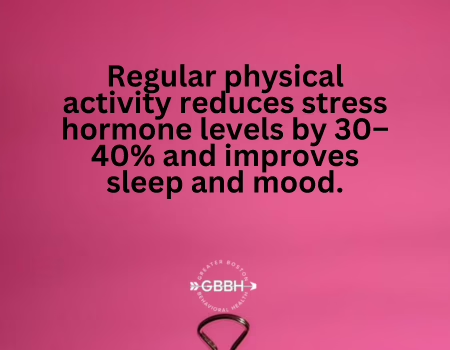Stress is an inevitable part of life. Whether it’s caused by work deadlines, financial pressures, family responsibilities, or unexpected life events, stress affects everyone. While a certain level of stress can be motivating or help us respond to challenges, chronic or unmanaged stress can have serious consequences for both physical and mental health. Understanding how stress affects the body and mind, as well as learning effective strategies to manage it, is crucial for leading a healthy and balanced life.
At Greater Boston Behavioral Health (GBBH), we recognize the profound impact stress can have on mental health. Through our Mental Health Programs, Group Therapy Programs, and specialized services like Trauma Therapy Programs, we empower individuals to address and manage stress effectively. This blog explores the physical and mental effects of stress, its long-term consequences, and actionable solutions to regain control.
What Is Stress?
Stress is the body’s natural response to perceived threats or challenges. When faced with a stressor, the body activates the “fight-or-flight” response, releasing stress hormones like adrenaline and cortisol. This response is designed to help us react quickly to danger or demanding situations. However, when stress becomes chronic—lasting weeks, months, or even years—it can wreak havoc on the body and mind.
Types of Stress
- Acute Stress: Short-term stress caused by immediate challenges, such as giving a presentation or navigating a conflict.
- Chronic Stress: Prolonged stress resulting from ongoing situations, such as financial difficulties or an unhealthy work environment.
- Traumatic Stress: Stress stemming from a past traumatic event, often addressed through Trauma Therapy Programs.
Physical Effects of Stress
Chronic stress affects nearly every system in the body. Over time, it can lead to a range of physical symptoms and long-term health complications.
1. Cardiovascular Problems
Stress causes an increase in heart rate and blood pressure, which can strain the cardiovascular system over time. Chronic stress is linked to:
- High blood pressure (hypertension).
- Increased risk of heart attacks or strokes.
- Persistent chest pain or arrhythmias.
2. Digestive Issues
The gut is highly sensitive to stress, which can lead to:
- Nausea, bloating, or upset stomach.
- Gastrointestinal disorders like irritable bowel syndrome (IBS).
- Exacerbation of conditions such as acid reflux or ulcers.
3. Muscular Tension and Pain
Stress causes muscles to tighten, leading to:
- Chronic tension in the neck, shoulders, and back.
- Frequent headaches or migraines.
- Increased susceptibility to injuries.
4. Immune System Suppression
Chronic stress reduces the body’s ability to fight infections, resulting in:
- Frequent colds or illnesses.
- Slower wound healing.
- Increased vulnerability to chronic diseases.
5. Sleep Disruptions
Stress often interferes with sleep, causing:
- Insomnia or difficulty falling and staying asleep.
- Restless sleep or vivid, unsettling dreams.
- Daytime fatigue and low energy levels.
Mental Effects of Stress
The mental toll of stress is equally significant. Chronic stress impacts emotional regulation, cognitive function, and overall mental health.
1. Anxiety and Panic Disorders
Prolonged stress is a common trigger for anxiety disorders. Symptoms include:
- Persistent worry or fear that interferes with daily activities.
- Panic attacks characterized by a racing heart, sweating, and shortness of breath.
- Avoidance of situations perceived as stressful, often addressed in an Anxiety Treatment Program.
2. Depression
Stress depletes neurotransmitters like serotonin and dopamine, increasing the risk of depression. Signs of stress-related depression include:
- Persistent sadness or hopelessness.
- Loss of interest in previously enjoyable activities.
- Difficulty concentrating or making decisions.
3. Cognitive Impairments
Chronic stress affects the brain’s ability to function effectively, leading to:
- Memory lapses and forgetfulness.
- Difficulty focusing or staying organized.
- Decreased problem-solving abilities.
4. Emotional Dysregulation
Stress heightens emotional responses, resulting in:
- Increased irritability or frequent outbursts of anger, often requiring support through Anger Management Programs.
- Difficulty calming down after stressful situations.
- Feelings of being overwhelmed or out of control.
5. Social Withdrawal
Many individuals coping with chronic stress isolate themselves from friends and family, which can exacerbate feelings of loneliness and hinder recovery.
Long-Term Implications of Chronic Stress
If left unaddressed, chronic stress can lead to severe long-term consequences, including:
- Mental Health Disorders: Prolonged stress significantly increases the risk of developing anxiety disorders, depression, or PTSD.
- Burnout: Chronic stress in work or caregiving roles can result in emotional exhaustion, reduced productivity, and detachment from responsibilities.
- Physical Health Complications: Conditions such as cardiovascular disease, diabetes, and autoimmune disorders are closely linked to chronic stress.
- Substance Use Disorders: Stress often leads individuals to use alcohol, drugs, or other substances as a coping mechanism, creating a cycle of dependency.
Effective Strategies for Managing Stress
Managing stress requires a combination of professional support, lifestyle changes, and self-care practices. At GBBH, we help individuals develop personalized stress management plans that align with their unique needs.
1. Professional Therapy
Therapeutic interventions provide tools and strategies to address the root causes of stress. Key programs include:
- Cognitive Behavioral Therapy (CBT): Helps individuals identify and challenge negative thought patterns.
- Trauma Therapy Programs: Address unresolved trauma that contributes to chronic stress.
- Group Therapy Programs: Create a supportive environment for sharing experiences and learning coping skills.
2. Mindfulness and Relaxation Techniques
Mindfulness-based practices can reduce stress and improve emotional regulation. Techniques include:
- Breathing Exercises: Slow, deep breaths to calm the nervous system.
- Progressive Muscle Relaxation: Alternately tensing and relaxing muscle groups.
- Meditation and Yoga: Promotes relaxation, focus, and a sense of control.
3. Building a Support Network
Connection is essential for stress management. At GBBH, our Family Therapy Programs help families work together to create a supportive home environment.
4. Physical Activity
Exercise is one of the most effective ways to manage stress. Benefits include:
- Releasing endorphins to boost mood.
- Reducing cortisol levels in the body.
- Improving sleep and overall energy levels.
5. Healthy Lifestyle Habits
Lifestyle changes can significantly reduce stress. These include:
- Eating a balanced diet rich in fruits, vegetables, and whole grains.
- Staying hydrated and limiting caffeine and alcohol.
- Establishing a consistent sleep routine.
6. Time Management and Prioritization
Feeling overwhelmed often stems from poor time management. Tips include:
- Breaking tasks into smaller, manageable steps.
- Prioritizing what’s most important and letting go of unnecessary commitments.
- Learning to say no and setting boundaries.
How GBBH Can Help
At Greater Boston Behavioral Health, we offer comprehensive services to address the physical and mental effects of stress, including:
1. Partial Hospitalization Programs (PHP)
For individuals needing intensive care, PHP offers structured daily support, focusing on stress management and skill-building.
2. Intensive Outpatient Programs (IOP)
IOP provides flexible, personalized therapy that helps individuals balance recovery with their daily responsibilities.
3. Family Therapy Programs
Stress can strain family relationships. Our programs help families improve communication and provide mutual support.
4. Anger Management Programs
For individuals struggling with stress-related anger, these programs teach constructive ways to process and express emotions.
5. Group Therapy Programs
Group therapy fosters connection, reduces feelings of isolation, and provides shared strategies for managing stress.
The Benefits of Managing Stress
When stress is effectively managed, individuals experience profound improvements in their quality of life, including:
- Improved Mental Health: Reduced anxiety, depression, and emotional dysregulation.
- Enhanced Physical Health: Lower risk of chronic diseases and improved energy levels.
- Stronger Relationships: Better communication and deeper connections with loved ones.
- Greater Productivity: Improved focus, creativity, and problem-solving abilities.
Why Choose Greater Boston Behavioral Health?
At Greater Boston Behavioral Health, we are dedicated to providing compassionate, evidence-based care to help individuals manage stress and lead healthier lives. Here’s what sets us apart:
- Expert Care: Our therapists specialize in treating stress-related conditions, including anxiety, depression, and trauma.
- Comprehensive Services: From Trauma Therapy Programs to Mental Health Programs, we offer tailored care for every need.
- Flexible Treatment Options: With PHP, IOP, and outpatient care, we provide support at every stage of recovery.
- Accessible Location: As a trusted Mental Health Treatment Center in Boston, we’re here to support individuals throughout the region.
Conclusion
Stress doesn’t have to dominate your life. With the right tools and support, you can take control, reduce its impact, and build a healthier future. At Greater Boston Behavioral Health, we’re here to guide you every step of the way.
Contact us today at (888)278-0716 to learn more about our services, including Mental Health Programs, Group Therapy Programs, and Family Therapy Programs. Together, we can help you overcome stress and thrive.
FAQ on Physical and Mental Effects of Stress
How does stress affect the body?
Chronic stress can lead to cardiovascular issues, digestive problems, weakened immunity, muscle tension, and sleep disturbances.
How does stress impact mental health?
Prolonged stress contributes to anxiety, depression, emotional dysregulation, cognitive impairments, and social withdrawal.
Can stress cause long-term health problems?
Yes, unmanaged stress can lead to serious conditions like heart disease, diabetes, mental health disorders, and burnout.
What are some effective ways to manage stress?
Stress can be managed through professional therapy, mindfulness practices, physical activity, healthy lifestyle changes, and building a support network.
What services does GBBH offer for stress management?
Greater Boston Behavioral Health offers programs like Mental Health Programs, Trauma Therapy Programs, Group Therapy Programs, and Family Therapy Programs to address and manage stress effectively.


